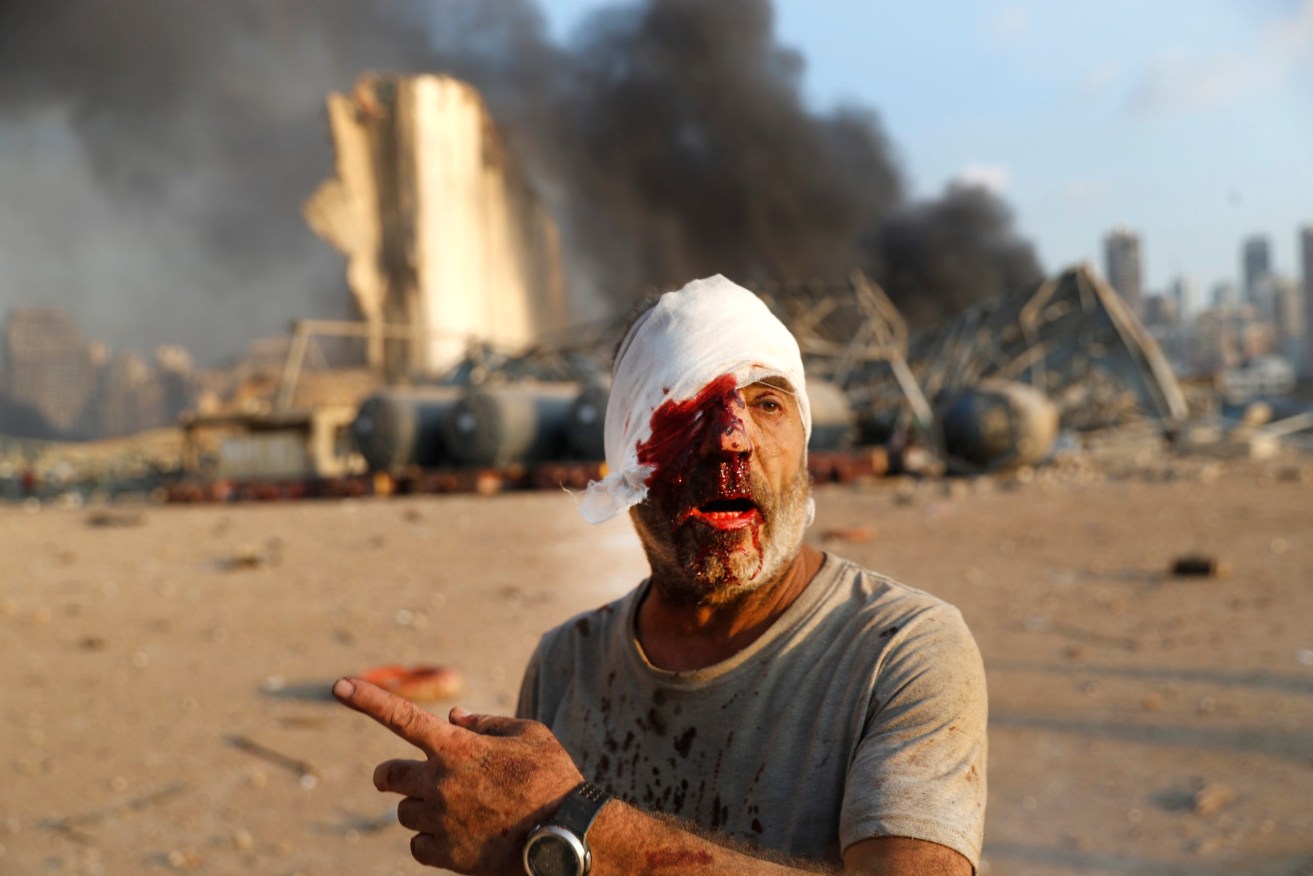Australian among 70 dead in giant Beirut blast – watch terrifying video
An Australian has been killed in a massive explosion in Beirut where more than 70 people have died and thousands more have been injured.

An injured man walks at the explosion scene that hit the seaport, in Beirut, Lebanon. (Photo: AP Photo/Hussein Malla)
Prime Minister Scott Morrison said one Australian had been killed and Australia’s embassy had been “impacted significantly” in the explosion.
https://twitter.com/borzou/status/1290675854767513600
Footage of the Explosion in #Beirut #Lebanon a few minutes ago. Praying for the safety of everyone. pic.twitter.com/6Q3y6A6DxL
— Fady Roumieh (@FadyRoumieh) August 4, 2020
Prime Minister Scott Morrison said the Australian embassy in the Lebanese capital had been “significantly impacted” but staff escaped without major injuries.
“It’s my deep regret to inform you that one Australian has been killed in this horrific blast,” he told the Nine Network.
A huge blast at a port warehouse district near the centre of Beirut rocked the city on Wednesday.
Mr Morrison said there were usually about 20,000 Australians in the Lebanese capital but he was unsure how many had returned to Australia because of the coronavirus pandemic.
“Our hearts really go out to our Lebanese Australian community,” the prime minister said.
“I know there will be many prayers in the churches and the mosques in Australia but given the COVID restrictions, I would just urge the appropriate response.”
The blast struck with the force of a 3.5 magnitude earthquake, according to Germany’s geosciences centre GFZ, and it was heard and felt in Cyprus more than 200 kilometers across the Mediterranean.
The sudden devastation overwhelmed a country already struggling with both the coronavirus and severe economic and financial crisis.
For hours after the explosion, the most destructive in all of Lebanon’s troubled history, ambulances rushed in from around the country to carry away the wounded.
Hospitals quickly filled beyond capacity, pleading for blood supplies and generators to keep lights on.
For blocks around the port, where the explosion took place, bloodied residents staggered through streets lined with overturned cars and littered with rubble from shattered buildings.
Windows and doors were blown out kilometres away, including at the city’s only international airport. Army helicopters helped battle fires raging at Beirut’s port.
Interior Minister Mohammed Fahmi told a local TV station it appeared the blast was caused by the detonation of more than 2700 tons of ammonium nitrate stored in a warehouse at the dock since confiscated from a cargo ship in 2014.
Witnesses reported seeing an orange cloud like that which appears when toxic nitrogen dioxide gas is released after an explosion involving nitrates.
What caused the detonation was not immediately clear.
Videos showed what appeared to be a fire erupting nearby just before and local TV stations reported that a fireworks warehouse was involved.
The fire appeared to spread to a nearby building, triggering the more massive explosion, sending up a mushroom cloud and generating a shock wave.
Charbel Haj, who works at the port, said the blast started as small explosions like firecrackers. Then, he said, he was thrown off his feet by the huge blast.
The explosion came amid ongoing tensions between Israel and the Hezbollah military group on Lebanon’s southern border.
Many residents reported hearing planes overhead just before the blast, fuelling rumors of an attack, though an Israeli government official said Israel “had nothing to do” with the blast.
President Donald Trump said the US “stands ready to assist Lebanon,” and US Secretary of State Mike Pompeo extended his “deepest condolences”.
“Our team in Beirut has reported to me the extensive damage to a city and a people I hold dear, an additional challenge in a time of already deep crisis,” Pompeo said in a written statement.
The blast was stunning even for a city that has seen a 15-year civil war, suicide bombings, bombardment by Israel and political assassinations.
“It was a real horror show. I haven’t seen anything like that since the days of the (civil) war,” said Marwan Ramadan, who was about 500 metres from the port and was knocked off his feet by the force of the explosion.
Health Minister Hassan Hamad said the preliminary toll was more than 70 dead and more than 3000 wounded.
Australian Foreign Minister Marise Payne said the embassy had considerable damage from the blast.
“About 95 per cent of the windows and front of the chancery of the embassy have been blown out,” she told ABC radio.
“Staff have been affected by a number of glass injuries. Fortunately, they are relatively minor and they have all been treated.”
Senator Payne said consular assistance had been extended to the family of the Australian who died.
Lebanese hospitals have been overwhelmed by victims from the blast and coronavirus.
“The challenge for many international supporters will be the context of COVID and how we work through that is something I’ll be discussing with officials,” Senator Payne said.
A DFAT spokesperson said the embassy was making urgent inquiries of local authorities to establish the full extent of the impact of the incident on Australians.
The spokesperson said all Australian embassy staff had been accounted for.
Australians who need consular assistance after the Beirut explosion can call (+61) 2 6261 3305 (outside Australia) or 1300 555 135 (inside Australia).
-AAP, ABC












